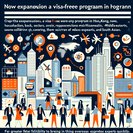
Hong Kong residents using Britain’s bespoke BN(O) visa route should prepare for stricter settlement rules after the UK Home Office confirmed on 21 November that a higher English-language standard and a potential income requirement are on the table. The proposals form part of a sweeping 12-week consultation on overhauling the UK’s immigration system unveiled by Home Secretary Shabana Mahmood.
Under draft plans, BN(O) holders applying for ‘indefinite leave to remain’ after five years in Britain would need to demonstrate English at level B2 of the Common European Framework—roughly equivalent to A-level standards—up from the current B1 benchmark. Officials said the "vast majority" of Hong Kong applicants should already meet the bar, but education advisers warn that mid-career arrivals may face extra tuition costs and exam bookings.
![UK plans tougher English test and possible income threshold for Hong Kong BN(O) visa settlers]()
The Home Office is also consulting on aligning BN(O) settlement with a new income threshold, mirroring broader reforms aimed at curbing low-wage migration. Although figures have not been published, lawyers expect the bar to sit near the £29,000 mark proposed for other categories. Employers sponsoring intra-company transfers of Hong Kong staff will need to verify that compensation packages meet both salary and English criteria long before renewal deadlines.
Unlike other routes, the BN(O) path retains its five-year qualifying period—avoiding the proposed extension to ten years that will affect many skilled-worker visas. That continuity offers relief to families who moved to the UK after Beijing’s 2020 National Security Law, yet the language and earnings proposals underline London’s political drive to tighten overall migration.
Global mobility teams should audit assignee populations now: identify workers and dependants whose English scores may fall short, budget for courses, and reassess cost-of-living allowances to clear a future earnings threshold. Stakeholders have until mid-February to submit feedback before the government finalises rules expected to take effect from April 2026.
Under draft plans, BN(O) holders applying for ‘indefinite leave to remain’ after five years in Britain would need to demonstrate English at level B2 of the Common European Framework—roughly equivalent to A-level standards—up from the current B1 benchmark. Officials said the "vast majority" of Hong Kong applicants should already meet the bar, but education advisers warn that mid-career arrivals may face extra tuition costs and exam bookings.

The Home Office is also consulting on aligning BN(O) settlement with a new income threshold, mirroring broader reforms aimed at curbing low-wage migration. Although figures have not been published, lawyers expect the bar to sit near the £29,000 mark proposed for other categories. Employers sponsoring intra-company transfers of Hong Kong staff will need to verify that compensation packages meet both salary and English criteria long before renewal deadlines.
Unlike other routes, the BN(O) path retains its five-year qualifying period—avoiding the proposed extension to ten years that will affect many skilled-worker visas. That continuity offers relief to families who moved to the UK after Beijing’s 2020 National Security Law, yet the language and earnings proposals underline London’s political drive to tighten overall migration.
Global mobility teams should audit assignee populations now: identify workers and dependants whose English scores may fall short, budget for courses, and reassess cost-of-living allowances to clear a future earnings threshold. Stakeholders have until mid-February to submit feedback before the government finalises rules expected to take effect from April 2026.











